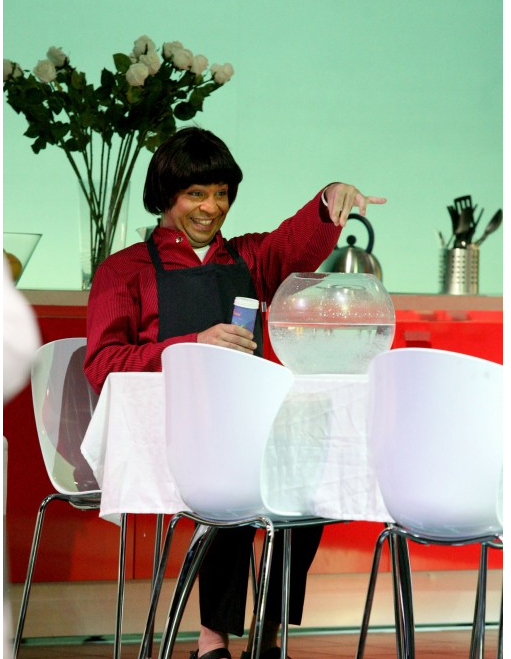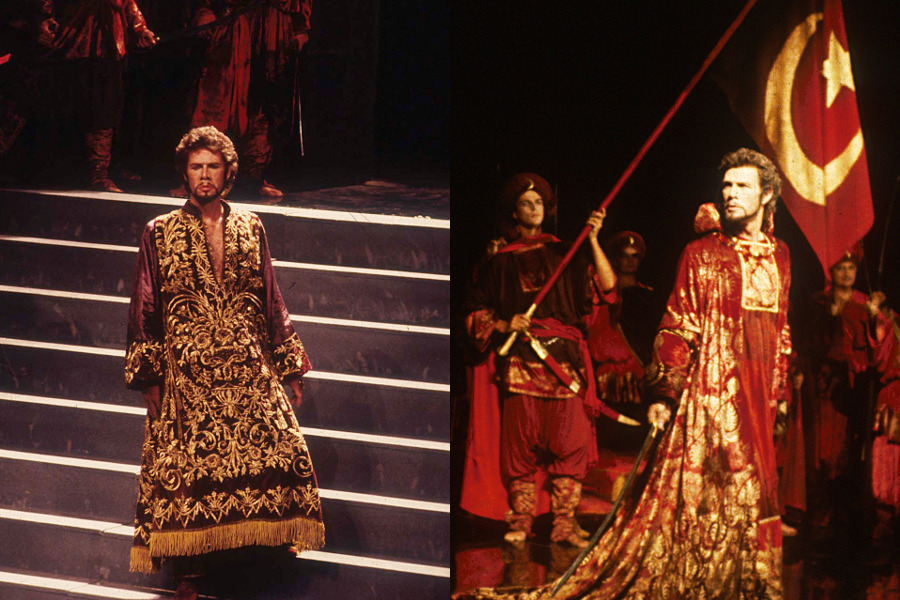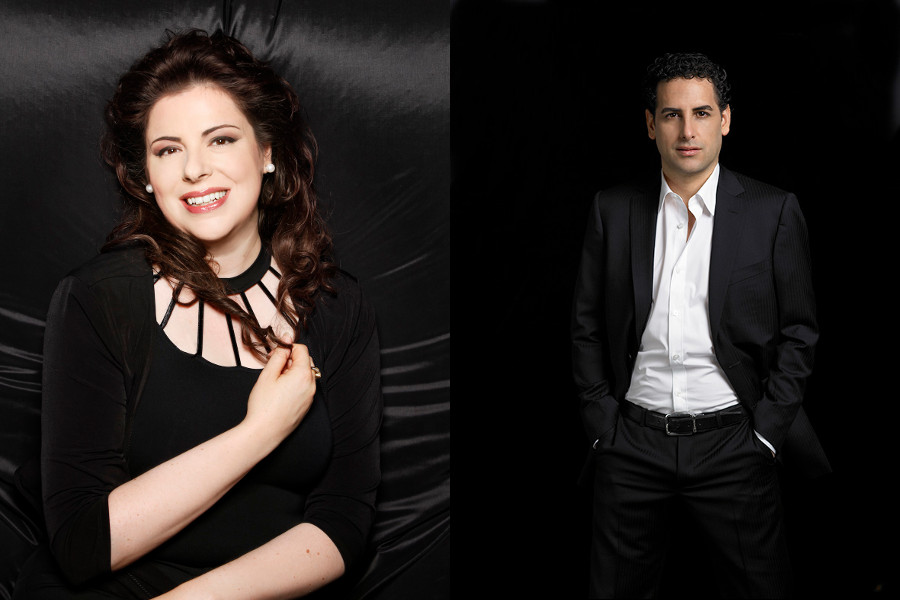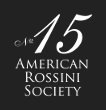Ernesto Palacio will be the next artistic director of ROF

Those who love the Festival need not be concerned. The beloved artistic heart of the festival, Alberto Zedda, is not leaving, but rather continuing with his very important work with the Accademia Rossiniana
The next artistic director, tenor, Ernetso Palacio, is a renowned Rossinian as well as an artist manager, who will bring high (Rossini) artistic standards to the Festival, thus ensuring the continuation of the priceless heritage which is treasured by Rossini lovers throughout the world.
Welcome, and Grazie
PS For those who never had the opportunity to hear this wonderful singer we suggest you check out this youtube link. Not only does it demonstrate the refined artistry of this singer, but it is also a rarely performed piece of music which we will hear this summer at ROF 2015!
https://www.youtube.com/watch?v=g1xf__Uh2P8&spfreload=10
A mini Accademia Rossiniana alumni meeting in NYC!

Paolo Bordogna ( class of 1998) greets Madison Marie Mcintosh ( class of 2014) after Paolo’s wonderful appearance at Casa Italiana Zerilli-Marimo.
Paolo has been in the US to sing a memorable Don Magnifico in Washington DC, and to share his new CD “Tutto Buffo” It was a great evening for the Accademia Rossiniana,The Rossini Opera Festival,and RossiniAmerica
ROF at NYU on May 26th! Don’t miss it!

Casa Italiana Zerilli/Marimo will be hosting a recital by Paolo Bordogna who is in the US in connection with Washington National Opera’s Cenerentola ( or Cinderella as they say in DC!). Paolo has just released a new CD “Tutto Buffo” as well!
The second half of the program will be devoted to the screening of “La Scala di Seta” from the 2009 Rossini Opera Festival! We hope to see you there.
More information is available at www.casaitaliananyu.org.
That’s Paolo in the picture by the way!
It may be called the Fidelio Podcast, but it’s about Rossini

This absolutely charming podcast is by Marie Ross, the Associate Principal Clarinetist with the Ensemble Matheus. We’re posting the link because it is so refreshing to hear the enthusiasm of a young musician for Rossini. She’s quite a story teller in addition to being quite knowledgable. We hope you’ll enjoy ” My year of living dangerously 4 – Rossini operas.”
Although her focus in discussing the Rossini revival is rather narrow ( based on her own experience) she makes a remarkable observation about Alidoro’s aria in “La Cenerentola” – pointing out that a key change similar to one in a song by Michael Jackson actually was first used by Rossini!
Here’s the link to the podcast: www.fideliopodcast.com. There are many episodes so you shall have to browse to find the Rossini ones, but it’s well worth the journey!
Teaching Rossini in America

As a life long lover of Rossini and an annual visitor to the Rossini Opera Festival in Pesaro, I have been pleased at the growing interest in Rossini’s serious operas in the United States. Around the time of Rossini’s two-hundredth birthday in 1992 there were a flurry of productions of rare and almost unknown works in America (Ermione, Bianca e Falliero, La pietra del paragone and others), but for they most part they were isolated moments. The Metropolitan even got into the game in 1990 with an elaborate period Semiramide with some of the best Rossini singers of the day (Horne, Cuberli, Ramey, Merritt). But then the revivals of these wonderful works seemed to falter…until recently. Today’s truly first rate bel canto singers, perhaps the best since the early nineteenth century, have stimulated a revival that has seen productions of Maometto II, Armida in recent years, and most recently La donna del lago.
In the last few years, La donna del lago has become almost a staple in European houses for the first time since 1850, but in this country it has been practically unknown–until Santa Fe Opera produced it in 2012 and the Metropolitan imported the production with Joyce DiDonato, Juan Diego Florez, and Daniela Barcellona for its 2014-15 season. The Met scheduled the opera for its HD series of live broadcasts in cinemas around the world, and Linda Bjelland, frequent Pesaro visitor and inveterate Florez fan (she belongs to the Florezidos–Juan Diego’s fan club, and travels the world following his performances), proposed that she and I offer a short course to introduce opera lovers to this work, culminating in the theater broadcast of March 14. Although Linda lives near Denver and I live 65 miles north of there in Colorado, we met in at the Rossini Festival in Pesaro. She proposed that we offer the course through the Academy for Life Long Learning, a school aimed at retirees, which offers courses in the Denver area.
I have to say that I was skeptical that we would enroll enough “students” to make the course preparations (not to mention the hour’s drive for me) worthwhile, so I was pleasantly surprised when we signed up 26 enthusiastic opera lovers. Linda and I split the time in the course, which totaled six hours over three sessions. In our first session, we placed Rossini in the context of his times and opera history and discussed his biography. In the second class we concentrated on Walter Scott’s Lady of the Lake and Rossini’s Naples operas. The third class was a detailed analysis of La donna del lago, illustrated by video clips. We also compared various productions we have seen recently (Paris, London, Milan, Santa Fe and Pesaro’s concert version). Of course there were pictures from Pesaro at Festival time, and for the finale we both wore ROF tee shirts we picked up at last summer’s festival.
Our students were very positive about the class, and I think we made several converts to the infinite pleasures of Rossini. The Met’s ex-Santa Fe production was not one of their best efforts, but it was actually set in Scotland and Rossini and Scott did not appear as characters on stage (as had been the case in London). One must be thankful for small things. Needless to say, the singing was absolutely wonderful, and audiences the world over were able to experience thrills akin to what nineteenth century audiences knew. Elena, “Uberto” and Malcom introduced thousands in all corners of the world to a spectacular Rossini opera, and perhaps our class helped a small group in our corner of the world appreciate Rossini even more.
–Charles Jernigan
Madison Marie McIntosh sings Rossini on May 3 in NYC
Accademia Rossiniana alum (2014) is presenting a recital in New York City on May 3. The first half of the program is devoted entirely to Rossini!
If you are in the area be sure to catch this performance.
Madison Marie McIntosh – in Recital
Christ & Saint Stephen’s Church
120 West 69th Street, New York, New York
Sunday, May 3, at 7:00 P.M.
Bel raggio lusinghier Gioachino Rossini
(Semiramide, 1823)
Una voce poco fa Gioachino Rossini
(Il barbiere di Siviglia, 1816)
Dunque io son Gioachino Rossini
(Il barbiere di Siviglia, 1816)
La fioraia fiorentina Gioachino Rossini
(Péchés de vieillesse)
L’invito Gioachino Rossini
(Soirées musicales)
Se la vita ancor t’è cara Gioachino Rossini
(Semiramide, 1823)
Ballade, op. 6 Amy Beach
(1894)
I can conjure you fire from the heavens George Frideric Handel (The Enchanted Island, 2011)
Oh sleep, why dost thou leave me? George Frideric Handel
(Semele, 1743)
Hello! Oh, Margaret, it’s you Gian Carlo Menotti
(The Telephone, 1947)
Five Poems of Nicola Rossi Lemeni Theodore Christman
Distanze
Sempre imparare
L’orologio
La morte di Don Giovanni
Gioia conclusa
(2015)
Sam Ramey is a 2105 Opera News award winner.

Sam Ramey, a member of the Honorary Board of the Friends of the Rossini Opera Festival has been chosen as one of the 2015 recipients of the prestigious Opera News awards, presented by the Metropolitan Opera Guild.
He has sung a variety of roles at the Met, but for some, his most memorable was in Rossini’s Semiramide where he, along with another Honorary Board member, June Andersen, created such sparks ( both coloratura and dramatic) on stage that it seemed like the scenery was at risk for catching on fire.
Ramey’s importance for Rossini cannot be underestimated. From his delightful Viaggio ( in the “original” with Abbado) to the masterful in Maometto, we have been blessed by his talent and commitment to his art.
Hats off to a master, and congratulations!!
Photo: Samuel Ramey in ROF 1985 “Maometto”. Credit: Studio tornasole.
New Honorary Board Members

C’era una volta – Once upon a time!
The happy outcome is that Juan Diego Florez and Daniela Barcellona have graciously agreed to become members of the Honorary Board of the Friends of the Rossini Opera Festival.
In an announcement from the Rossini Opera Festival in Pesaro, Alexander Crary, the President of the Friends stated: “I extend a warm welcome to singers, Daniela Barcellona and Juan Diego Flórez, who have joined the Honorary Board of the ‘Friends of the ROF’. It is a great pleasure to have these distinguished artists join the ‘Friends’ in this special capacity. Their support and friendship is deeply appreciated”.
This is indeed wonderful news. The Friends recently mourned the loss of two members of the Honorary Board Claudio Abbado and Luca Ronconi. In the best opera tradition, after sadness comes joy, and that is what this announcement brings us all.
But back to “una volta”. The story of the breakthrough of Juan Diego Florez at the Rossini Opera Festival has been told elsewhere on this site. In 1996 he came to participate in a master class at the Accademia Rossiniana as well as sing a “minor role” in Ricciardo e Zoraide. The lead tenor in Matilce di Shabran, withdrew, and the rest is history. But,Ricciardo e Zoraide was still “historic” that year, because Daniela Barcellona who had graduated from the Accademia the year before sang the role of Elmira ( note to those who don’t know the opera, it’s not a “trouser role”!)
So, we are indeed fortunate to have these wonderful artists who have been connected to the Rossini Opera Festival as members of the Honorary Board. It is we who are honored.
(Juan Diego Flórez Photo: Decca / Josef Gallauer)
RIP Nick del Vecchio
Nick was an enthusiastic attendee of many ROF seasons and wrote about his experiences for his website livingattheopera.com. He also generously shared his thoughts and interviews with rossiniamerica.org.
Anyone with information on how to contact Nick’s friends or managers of his website are encouraged to contact us at info@rossiniamerica.org
He will be missed.
ROF 2015 program change and reminder
Nicola Alaimo, known to Festival goers from William Tell ( 2013)and Matilde di Shabran(2012) will be giving one of the three Bel Canto concerts this summer at ROF. He will perform on August 21, instead of Florian Sempey.
ROF Friends are reminded that March 25 is the starting date for booking. Note, Italy has not yet changed to “Daylight Savings Time” so there is a 5 hour time difference between Italy and ET.
Wednesday, March 18th is the last opportunity to see the HD transmission of the Met’s La Donna Del Lago in US theaters.
